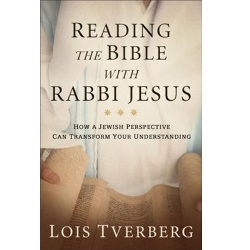The subtitle for this book describes its focus: How a Jewish Perspective Can Transform Your Understanding. The author desires to “mentally bridge the culture gap between [the] Middle Eastern, Jewish world and ours in order to read the Bible as natives… from the Hebraic perspectives of its first readers.” She does an excellent job of accomplishing her purpose.
Tverberg shows us that, if we aren’t sensitive to how the Biblical text might be speaking from a different culture, we will tend to fill in the gaps with our own “reality” – and that may not be reality at all. The book covers quite a bit of ground. Here are some of the things that grabbed my interest.
The author brings out an interesting observation when looking at the variety of English Bible translations and the diversity in the way some passages are rendered. This is an area where I personally have a strong interest, and I appreciate her approach to this subject. She observes that the Biblical Hebrew language has a vocabulary of about eight thousand words, as compared to more than one hundred thousand words in the English language. She takes a deep look at the use of inference, context, and broad-brushed strokes of language that cannot be captured in a limited word-for-word translation of text. As I read this, I thought of the Amplified Bible and what sometimes seems like over-wordiness to get a point across. The author states, “rather than clinging to one translation, you’ll actually get a clearer idea if you read from more than one version and then compare them.” I’ve often experienced this when studying with others who, as we take turns reading using different translations.

 Reading the Bible with Rabbi Jesus
Reading the Bible with Rabbi Jesus
How a Jewish Perspective Can Transform Your Understanding
Lois Tverberg
Baker Books, Grand Rapids, 2019
Recently it has been popular in some circles to emphasize the difference between Greek and Hebrew thinking, or to break down a setting into “honor” and “shame.” While acknowledging these concepts, this book does not get hung up on these issues. The context and original intent of the writers is brought to the forefront, and where these come into play she mentions them. A communal perspective, rather than a personal (perhaps selfish?) perspective also helps to both clarify and unify some of the Bible themes.
With these thoughts in mind, I was very impressed with the final chapter of this book. In one part of it the author takes an insightful look at Isaiah 53, and specifically Isaiah 53:12. The typical English translation reads something like:
Therefore I will divide Him a portion with the great,
And He shall divide the spoil with the strong,
Because He poured out His soul unto death,
And He was numbered with the transgressors,
And He bore the sin of many,
And made intercession for the transgressors.
(Isaiah 53:12 NKJV)
Recognizing this as a Messianic passage, the prophecy seems to end with what she describes as a “tepid, half-hearted applause. Along with many others, the Servant will be given a prize, maybe a firm handshake and a pat on the back for all the anguish he endured. Does this seem reasonable?”
She then quotes this same verse from the 1985 New Jewish Publication Society Tanakh:
Assuredly, I will give him the many as his portion,
He shall receive the multitude as his spoil…
(Isaiah 53:12a, NJPS)
Strictly speaking, both translations are literally correct. But the deeper shades of meaning brought in by the Messianic expectations of the context here in the NJPS make it much more powerful – and this is from a translation published by those who do not recognize Yeshua as Messiah. They do, however, recognize the Messianic expectations described in this portion. For more on the Jewish messianic understanding, consider Daniel Boyarin’s The Jewish Gospels.
Lois Tverberg isn’t shining new light, but rather old light onto the setting of Bible passages – the ancient context that most of us in our modern paradigm don’t get. According to the author bio in the back of this book, as co-founder of En-Gedi Resource Center “she published her first book, Listening to the Language of the Bible, a devotional guide to Hebrew words and ideas.” Included in this book as an appendix she lists thirty English concepts with the corresponding Hebrew words, each with a short paragraph expounding on deeper meanings we might otherwise miss. Following up on this, another appendix discusses types of Bible translations one might use for further word study. Again, as one particularly interested in a variety of translations, I found this most interesting.
Reading the Bible with Rabbi Jesus is relatively easy to read and not overly dry and academic. There are 13 chapters divided into 3 sections, 3 appendices, and thorough notes followed by both a subject and a scripture index and other recommended resources. Besides the hardcover and paperback editions, you can read this book free with a Kindle Unlimited subscription or listen free with Audible.
Reading the Bible with Rabbi Jesus
How a Jewish Perspective Can Transform Your Understanding
Other titles by Lois Tverberg:
Sitting at the Feet of Rabbi Jesus (2018)
How the Jewishness of Jesus Can Transform Your Faith
Walking in the Dust of Rabbi Jesus (2013)
How the Jewish Words of Jesus Can Transform Your Life
Listening to the Words of the Bible (2004)
Hearing It Through Jesus Ears



Thank you for your review! Very thoughtful, I appreciate it. Blessings, Lois